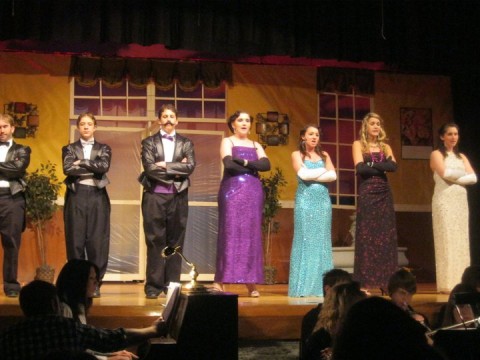Filichia Features: Divorce Me, Darling! The sequel to The Boy Friend
Filichia Features: Divorce Me, Darling! The sequel to The Boy Friend
 It was an inspired notion. Ten years after Sandy Wilson had struck gold as the bookwriter, composer and lyricist of The Boy Friend, he decided to revisit those “perfect young ladies from finishing school” that he’d created. Now he’d imagine how they’d fare a decade later with the boy friends who’d become their husbands.
It was an inspired notion. Ten years after Sandy Wilson had struck gold as the bookwriter, composer and lyricist of The Boy Friend, he decided to revisit those “perfect young ladies from finishing school” that he’d created. Now he’d imagine how they’d fare a decade later with the boy friends who’d become their husbands.
As any Marilyn Monroe fan can tell you, some marriages get in trouble after seven years when a famous itch supposedly needs to be scratched. So what can we expect from the ten-year marriages between the once-blissful Polly and Tony or Maisie and Bobby?
Well, the average British citizen of 1936 was probably more well-mannered than many of his American counterparts, so Wilson didn’t call the show Divorce Me, You Bum (or use a noun far worse). Divorce Me, Darling! was his title of choice. It suggests a more civilized look at marital difficulties – and even a light-hearted one. No, this 1964 musical will never be confused with Welcome to the Club, a 1989 musical in which ex-wives were so furious with their deadbeat ex-husbands that they called the police and had the lugs put in alimony jail.
Still, breaking up is hard to do under any circumstances, even if the correspondents in Divorce Me, Darling! are neglect, boredom and disillusionment. Add to the list mistaken identity and misunderstanding, and you’ve got a fun-filled musical comedy.
Wilson didn’t overlook the fact that the world was a very different place in 1936 than it had been in 1926. The Great Depression wasn’t limited to America, but affected England profoundly, too. So we find that Polly’s father Percival Browne desperately tried to make money quickly to pull himself out of a financial quagmire and wound up being accused of illegalities.
Madame Dubonnet, whom he’d married at the end of The Boy Friend, must now financially fend for herself, so she decides to become a star in show business. (Who knew it was that easy?) However, this was the era when a hotel would routinely have a sign that warned “We do not rent to theatricals,” which explains why Madame Dubonnet doesn’t want to perform in front of her son-in-law The Honourable Tony Brockhurst. She’s ashamed. So she gets Hortense, her merry maid from The Boy Friend, to take her place.
Directors have undoubtedly dealt with many an actress who’s proclaimed at auditions, “Hell, I’d even play the maid to be in a show” – but then shortly after she’s been cast as a servant and dons her black-and-white uniform, becomes a little bored. Worse, the actress becomes dissatisfied that she’s essentially working like – well, a maid. At least here the performer you’ll cast as Hortense will get a big share of a duet and later sing a few solo lines in a performance number where she’s center stage. True, in the latter song, she’ll be pretending to be Madame Dubonnet, and she’ll be interrupted when her ruse is quickly discovered. But she does get more than the average on-stage maid.
Meanwhile, our two main couples from The Boy Friend have troubles of their own. Polly and Bobby each return alone to Nice where things used to be much nicer.
Tony’s career has given him the title The Honourable Tony Brockhurst. In fact, he IS honourable when it comes to his marriage. And while Polly knows he’s faithful, she knows deep in her heart that the reason is not devotion. Tony is simply too busy working to even consider a dalliance. As Polly says, “The old ancestral acres mean more to him than anything – even me.”
So much for Tony’s only wanting “A Room in Bloomsbury,” as he proclaimed in his youth and in The Boy Friend. Like so many other men, his ambition and a need to be wealthy took over. His preoccupation causes Polly (and the other wives) to wonder “Whatever Happened to Love?” while she sees that the café where they fell in love has been closed. What a metaphor!
Don’t worry about them too much, folks. The café is about to reopen, which gives us a much better metaphor.
Similarly, when Polly asks Bobby about Maisie, the way he answers her reveals a lot: “She’s fine, I guess.” Bobby claims he just wants “Someone to Dance With” – certainly a euphemism for what he really desires. Frankly, at this point Bobby seems to be a younger version of randy old Lord Brockhurst, who chased cuties non-stop in The Boy Friend.
The mere fact that Bobby asks Polly to have dinner with him also suggests a wayward inclination – for in those days, two members of the opposite sex who were married to others could not be seen with each other at night; that was tantamount to an admission of adultery. Hence, Polly is reluctant to agree. But she does.
After dinner, Bobby gives a champagne toast to “absent friends” – but truth to tell, Bobby is happy that Maisie isn’t around. He’s definitely the aggressor in romancing Polly. “You and I deserve a break from the monotone of the marriage routine,” he insists.
Maybe Bobby no longer appreciates Maisie, but three of her former beaux muse in song, “I wonder where Maisie is now?” Anyone who has fond memories of a former boyfriend or girlfriend – be it the first, 21st or 121st love – will relate to this snazzy song.
In a show such as this, spouses always show up unexpectedly. If Polly dared hope that Tony came to revitalize their marriage, she’s soon disillusioned when he says he’s there because he “needs a break from work.” The last straw occurs when he calls her “Old Girl.” Now she’s got to make him jealous.
Bad move. Divorce Me, Darling! -- musical theater trifle that it is -- does reiterate that two wrongs don’t make a right. Polly and Bobby both find that a lie of any kind, even one of omission, can cause more trouble rather than eradicate it.
It’s a rare sequel that doesn’t add some new characters, and Divorce Me, Darling! follows the template. We meet Hannah, Bobby’s older sister, who’s out hunting for a fortune and a husband (in that order). As soon as she finishes singing “Here I Am, but Where’s the Guy?” enter Sir Freddy ffotherington-ffitch – a self-proclaimed “silly ass.” At the very least, he’s a mamma’s boy – well, more accurately an auntie’s boy. Lady Brockhurst wants him around so he can keep an eye on the Lord who makes clear he wants to be “on the loose from the marriage noose.” (Yes, both of them appear in this show, too.)
While some Brits have been known to roll their “r’s” incessantly (“That’s rrrrripping!”), Sir Freddy can’t pronounce his at all. Thus, you’ll need an actor who won’t be flummoxed from a lifetime of pronouncing words correctly, but can say westaurant, wemember and Amewican as if he’s been saying them that way since his first tooth came in.
Although the show takes place ten years after The Boy Friend, the score doesn’t sound like Ten Years After, that rock group from the late ‘60s. We’re in the ‘30s here, so your orchestra/band will replicate the sweet English sound that was once heard in the best clubs in posh hotels. The zippy score includes “You’re Absolutely Me,” which is purposely reminiscent of another ‘30s song, one by Cole Porter that mentions both Mahatma Gandhi and Napoleon Brandy. And while the title song has wives proclaiming, “If you believe I’ve been untrue to you, divorce me, darling,” at show’s end they’re instead singing “Let’s have a honeymoon instead of a divorce, my darling.”
Given that Wilson died on August 27, we must console ourselves that he lived until the ripe age of 90. As a tribute, you might produce Divorce Me, Darling! For those who think that The Boy Friend is just a lit-tle too sweet, here’s another period piece with a bit more bite.
But some ambitious companies have actually done The Boy Friend at matinees and Divorce Me, Darling! at night. If you are interested in presenting both shows in repertory, you must have a great choreographer on hand. There’s plenty of dancing in both, from soft shoe to tap.
Casting Percival involves a challenge, because the plot has him mistaken for The President of (the mythical) Monomania. Thus you’ll need to find two actors who can pass for each other. Although only one is Chief of State, they must both have gravitas. Cast accordingly.
As for the rest of your casting, you could of course have the same performers play the same roles in each musical. Lord and Lady Brockhurst would pose no particular problem, for your late-middle-aged actors in the first show could easily pass for a decade older in the second. But when casting your leads – the young people – you’d be well-advised to choose performers in their twenties. That way, they won’t seem too old for The Boy Friend or too young for Divorce Me, Darling!
Do you have talented teens who have equally talented older brothers and sisters? Then put the former in The Boy Friend and the latter in the same roles in Divorce Me, Darling! Even if the teens have young-looking parents, you might get away with having them play their older selves in the sequel. Remember – the family that does plays together stays together. It’s a great way for husbands and wives to bond and not have to say “Divorce me, (expletive deleted).”
 You may e-mail Peter at pfilichia@aol.com. Check out his weekly column each Tuesday at www.masterworksbroadway.com and each Friday at www.kritzerland.com. His new book, Strippers, Showgirls, and Sharks – a Very Opinionated History of the Broadway Musicals That Did Not Win the Tony Award is now available at www.amazon.com.
You may e-mail Peter at pfilichia@aol.com. Check out his weekly column each Tuesday at www.masterworksbroadway.com and each Friday at www.kritzerland.com. His new book, Strippers, Showgirls, and Sharks – a Very Opinionated History of the Broadway Musicals That Did Not Win the Tony Award is now available at www.amazon.com.


























